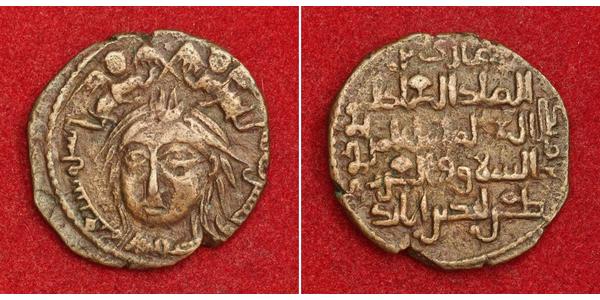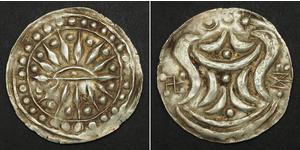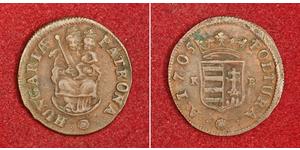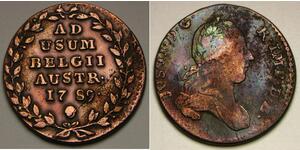(售价 $66.0)
1161, Zengid Dynasty, Qutb al-Din Mawdud. Bronze "Solar Eclipse" Dirhem Coin. VF-
Culture: Zengid Dynasty Denomination: AE Dirhem Mint Year: 1161 AD (AH 556) Condition: Corrosion scars, otherwise VF! Ruler: Qutb al-Din Mawdud, as Emir of Mosul (1149-1170 AD). Reference: Spengler/Sayles 59.2, Edhem 118, Butak 70, Artuk 1250, Album 1858. Weight: 11.84gm Material: Bronze Diameter: 30mm
Obverse: Male bust facing with long hair strains (personification of the sun), two angels above head, kufic legend around. Comment: On 9th of February, 1160, there was a solar eclipse, which was sighted in Mosul! Reverse: Inscriptions in five lines.
The Zengid (or Zangid) dynasty was a Muslim dynasty of Turkish origin, which ruled parts of Syria and northern Iraq on behalf of the Seljuk Empire.
The dynasty was founded by Imad ad-Din Zengi, who became the Seljuk Atabeg (governor) of Mosul in 1127. He quickly became the chief Turkish potentate in Northern Syria and Iraq, taking Aleppo from the squabbling Artuqids in 1128 and capturing the County of Edessa from the Crusaders in 1144. This latter feat made Zengi a hero in the Muslim world, but he was assassinated by a slave two years later, in 1146.
On Zengi's death, his territories were divided, with Mosul and his lands in Iraq going to his eldest son Saif ad-Din Ghazi I, and Aleppo and Edessa falling to his second son, Nur ad-Din, atabeg of Aleppo. Nur ad-Din proved to be as competent as his father. In 1149 he defeated Raymond of Poitiers, Prince of Antioch, at the battle of Inab, and the next year conquered the remnants of the County of Edessa west of the Euphrates. In 1154 he capped off these successes by his capture of Damascus from the Burid dynasty that ruled it.
Now ruling from Damascus, Nur ad-Din's success continued. Another Prince of Antioch, Raynald of Châtillon was captured, and the territories of the Principality of Antioch were greatly reduced. In the 1160s, Nur ad-Din's attention was mostly held by a competition with the King of Jerusalem, Amalric of Jerusalem, for control of the Fatimid Caliphate. Ultimately, Nur ed-Din's Kurdish general Shirkuh was successful in conquering Fatimid Egypt in 1169, but Shirkuh's nephew and successor as Governor of Egypt, Saladin, eventually rejected Nur ad-Din's control.
Nur ad-Din was preparing to invade Egypt to bring Saladin under control when he unexpectedly died in 1174. His son and successor As-Salih Ismail al-Malik was only a child, and was forced to flee to Aleppo, which he ruled until 1181, when he was murdered and replaced by his relation, the Atabeg of Mosul. Saladin conquered Aleppo two years later, ending Zengid rule in Syria.
Zengid princes continued to rule in Northern Iraq well into the 13th century, ruling Mosul until 1234; their rule did not come finally to an end until 1250.
Qutb ad-Din Mawdud (died 6 September 1170) was the Zengid Emir of Mosul from 1149 to 1169. He was a brother and successor of Saif ad-Din Ghazi I.
At the death of Zangi, his possessions were divided between his sons: Nur ad-Din received Aleppo and Saif ad-Din Ghazi Mosul, while Qutb ad-Din Mawdud received the emirate of Hims. After the death of Saif ad-Din Ghazi in 1149, Qutb ad-Din Mawdud was the first to arrive in Mosul, being able to have himself recognized as emir; Nur ad-Din, who desired to add the city to his lands, occupied Hims and Sinjar, preparing to attack his brother. Only the intervetion of veterans of the Aleppo army, who refused to take part in the fratricide war which would weaken the effort against the Crusaders and the emirate of Damascus, forced Nur ad-Din to renounce to the expedition and to reconciliate with his brother.
In 1164, Shirkuh, a general of Nur ad-Din, fought King Amalric I of Jerusalem for the control of Egypt. When he found himself in a weak situation, Nur ad-Din launched an expedition against the Principality of Antioch to divert the Christian forces. The Artuquid emirs of Mardin and Diyarbakir, as well as Mawdud, joined him in the attack, which turned to be successful: the towns of Harim and Banias were captured, and Amalric had to abandon Egypt. For the same reason, Mawdud helped his brother in the County of Tripoli in 1167.
At the beginning of 1168, Kara Arslan, the Artuqid emir of Hasankeyf, died, and Qutb ad-Din Mawdud tried to conquer that city; but he was pushed back by Nur ad-Din, who had promised to defend Arslan's successors.
Qutb ad-Din Mawdud died in September 1170. He had designed as successor his second son Ghazi II Saif ud-Din.
Only 1$ shipping costs for each additional item purchased!
2 Liard Austrian Netherlands (1713-1795) 銅
本组有 4 钱币 / 4 售价
⇑
















-300-150-N7QKX9ISGfEAAAFX9awaL_VH.jpg)







